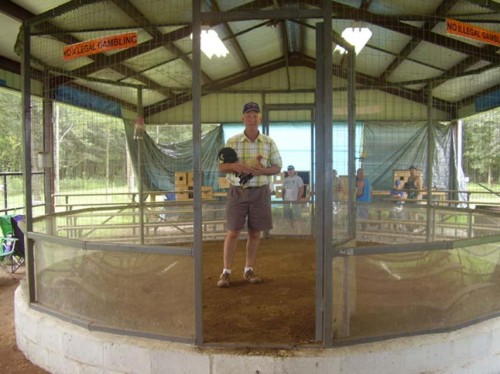
Freddie Howard
July 16, 2007
Murphy Candies, Jr.
July 18, 2007Two things are notable when seeing a cockfight.
The first is the beauty of the roosters. Like many birds, the male chicken is much brighter than the hen, but popular images of the rooster invariably fail to show off the black, white and rust coloring found singly or in combination on most of the cocks. The birds are taller, and their stance is prouder, than is commonly imagined, and their crowing becomes less apparent the longer a person is around them.
The second noteworthy thing is the absence of blood in the fight pit. The gamecocks have gaffs, or small hooks, strapped to their feet, but a spectator cannot see flesh being torn, or spilled blood in the ring. Cockfight matches fought with blades, however, may be bloodier.
But Peter Benoit is saying that he is holding his last cockfight.
On the Saturday morning following the week when Gov. Kathleen Blanco signed into law a bill prohibiting cockfighting in all of Louisiana beginning in August 2008, Benoit held a series of informal matches mostly for the cockfighters in Choupic, a small community in Lafourche Parish northwest of Thibodaux.
Benoit’s house in Choupic has an open shed in his backyard containing an 11-foot tall, slightly octagonal, wire and Plexiglass pit cage resting on a double-stack of white cinderblocks. Four unpainted wooden bleachers surround the pit.
Around 20 people went to his backyard Saturday morning, both spectators and gamecock owners.
“It’s just guys getting together to fight their chickens,” Benoit said. “These guys just do it for a good time. It’s a culture. It’s been going on for years.”
Louisiana was the only state in the U.S. that permitted cockfighting until this week. Individual parishes, like Orleans, had been allowed by the state to outlaw cockfighting, however.
Wagering on the sport is technically illegal, but betting has nevertheless flourished. Longtime cockfighting-opponent Art Lentini, a state senator from Kenner, pushed through a bill putting teeth into the prohibition on betting at the matches, which will take effect later this summer.
Cockfighters in the state have long known that the end was probably near. In past years, numerous bills emerged in the Louisiana Legislature proposing to ban cockfighting, but all of them failed to reach the governor’s desk. However, cockfighters watched nervously as one state after another outlawed the sport.
The death of legalized cockfighting in Louisiana was cinched when New Mexico, the only holdout besides Louisiana, outlawed the sport in June.
“Why do they concentrate on chicken fights when people have been flooded out in New Orleans,” Benoit asked. “It’s people from the cities who oppose this, not country people. There’s no blood slinging everywhere. It amazes me.”
Benoit, who works as a mechanic at a chemical plant, does not raise or fight gamecocks. He built his pit for cockfighters to use for tournaments and pickup matches, as on Saturday. He said he has only conducted matches with roosters wearing gaffs, not blades.
Bird owners haul the roosters to the pit in cages.
The cockfight begins with the two gamecock owners cradling their birds facing one another inside the pit. A referee holding a baton stands between them. The owners let the roosters peck at one another to build up fighting energy.
The gamecock owners press their lips against the napes of the birds, and blow warm air to keep the roosters’ muscles loose. The owners also stroke the heads of the birds to help rouse them.
They then place the birds facing one another behind chalk lines set around four feet apart, and step back.
The birds clash immediately, in a tangle of feathers.
In many of the matches, one bird quickly shows dominance. In a flash, one of them is lying on the ground-exhausted. The dominant rooster stands on top of his downed opponent, picking at its body.
At this point, one of the owners, or the referee, yells, “Count!” A 10-second countdown begins in which the weaker bird can fight back. If it does not, the roosters are pulled apart, and placed behind the chalk lines to go at one another again.
The weaker bird is given two more chances to stand up to the dominant rooster. If it is unable to do so, the match is won by the dominant bird.
In a small number of matches, a dominant rooster did not emerge quickly, but inevitably one of the cocks went down.
At times, birds tried to maneuver behind their opponents, pecking incessantly.
On a few other occasions, one of the cocks vaulted spectacularly over the side of his opponent with its feet and wings extended, resembling a martial arts fighter flying feet first through the air.
Frequently, the roosters became exhausted during the match, and laid on top of one another in a heap. When that happened, one of the men in the pit yelled, “Handle!” and the birds were pulled apart.
The owners dipped their hands into water cans hanging on the inside of the cage, and rubbed the liquid into the birds’ faces to refresh them.
In the case of two or three of the cocks, when placed behind the chalk line to have another clash with his opponent, the rooster squatted. The side of its limped head lay on the ground, its body too exhausted or injured to move.
Occasionally, one of the roosters in a cockfighting match dies in the ring. On Saturday morning, one bird was pulled from the cage apparently dead after it went down quickly in a match that pitted two birds of seemingly equal fighting ability.
Also, the roosters sometimes die from the wounds they receive in the cockfight, though gamecock owners try hard to keep their valuable property healthy.
Schriever resident Randy Sanchez, whose bird lost its match Saturday morning, worried that his rooster may die from the wounds it received in the pit.
“The bird got rattled,” he said. “He had a lung shot.”
“It’s a myth about every bird dying,” Benoit said. “Some do die, but it’s not all the time that one dies. Usually one does get injured.”
“The boys know how to handle the birds,” he said.
He pointed to one vainglorious rooster strutting in its cage close to the pit.
“Somebody took the time to raise this beautiful bird,” he said.
Benoit is acutely aware of the criticism cockfighting has taken for the free-flowing amount of money that is wagered on the sport.
“Anywhere you go in Louisiana they wager, ” he said. “If you take wagering away from the horse track, who would go? Why come down on me and not the local grocer selling lottery tickets?”
“How can they not make bass fishing illegal when they put money in a pot (for which the fishermen compete to win)?” he said. “What’s the difference? They bet on football. Why is it so wrong?”
Benoit contrasted his small backyard cockpit with other facilities.
“Some places have air conditioning and big buildings,” he said. “They have tournaments in Hawaii, and everywhere.” (Cockfighting is especially popular in Hawaii).
At Benoit’s cockpit Saturday, two men challenged one another’s rooster to a fight. A wad of cash appeared.
“They wager to cover the cost of (caring for) the birds, and feed,” he said.
Benoit feels no love lost between him and State Sen. Lentini. Another outspoken cockfighting opponent, U.S. Sen. David Vitter, also is bright on Benoit’s radar screen.
“Lentini did his homework about the wagering,” he said. ” He knows that if they can’t wager, the owners will lose money.”
“Vitter likes prostitutes,” Benoit said. “He pounded cockfighting, but he’s just as immoral.”
Benoit said he hopes that Lentini will get caught in an indiscretion like Vitter.
“Every politician has done something,” he said.
Benoit talked less about the other major criticism hurled at cockfighting – that the sport is inherently cruel to the birds. (Gamecocks are not typical roosters. They are specially bred to have stamina for fighting. The birds are naturally aggressive toward other roosters, and do not have to be trained to fight to the death.)
Benoit pointed to the long natural spur that grows on the lower leg of all roosters.
“It’s in their blood to fight,” he said. “They’re a territorial bird.” Later, he said, “If you put two rabbits in a cage, they’ll fight one another.”
“These boys can’t compete against the Humane Society and PETA,” he said. “Maybe in Lafayette where (cockfighting) is bigger, but not here.”
Like many persons involved with cockfighting, Benoit pointed out the relatively small number of birds that die in the sport compared to the millions of chickens killed yearly for human consumption.
Jason Bourgeois, a Choupic resident who fought one of his roosters Saturday morning, echoed Benoit.
“If you want to see blood, go to a slaughterhouse for chickens,” he said.
Choupic resident Jimmy Anders, who was at the pit Saturday, said, “People downgrade it, but they’ve never seen it. It’s just like an R-rated show. If you don’t want to see it, don’t go.”
Anders, who has been fighting birds since he was 13, brought up another issue affecting cockfighters in Louisiana: What will they do with their roosters and their cockfighting equipment when the sport is outlawed next year?
First things first. Anders said he will not go underground with (cockfighting).
“I’ll just fight my birds until they die,” he said. “I’ll give the winners away.”
He said that he has sent his brood stock to Mississippi, where he said the maximum fine for fighting cocks is only $5,000. He said that the maximum fine in Alabama is $25 to $50, “so it’s practically legal there.”
Anders will lose hundreds of dollars worth of gaffs and blades he owns that he stores in a small chest. He emphasized that although he owns blades, only gaffs are used in Choupic.
“I don’t do this for the money,” Anders said. “I’ll probably save money (when it’s outlawed).”
Sanchez said he invests $400 to $500 a month in cockfighting. He said he is going to release his birds into the woods after cockfighting is outlawed in Louisiana.
Benoit said he will definitely demolish his cockfighting pit when the sport is outlawed, but he may tear it down as early as this week since he does not plan to have any more cockfights at his pit.
“I’ll have a party when I tear it down,” he said. “I want to donate the bleachers to a ballpark.”
Tommy Boudreaux is ready to battle with his gamecock at a match in Choupic Saturday. * Staff photo by MIKE BROSSETTE















